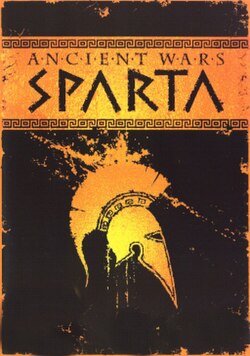Ancient Wars: Sparta
| Ancient Wars: Sparta | |
|---|---|
 |
|
| Developer(s) | World Forge |
| Publisher(s) | Playlogic |
| Distributor(s) | Eidos Interactive |
| Director(s) | Vladimir Nikolaev |
| Producer(s) |
|
| Designer(s) | Roman Volkov |
| Programmer(s) | Evgeniy Lominin |
| Writer(s) | Egor Gudovich |
| Composer(s) | Dynamedion |
| Platform(s) | Microsoft Windows |
| Release date(s) | |
| Genre(s) | Real-time strategy |
| Mode(s) | Singleplayer, multiplayer |
| Aggregate score | |
|---|---|
| Aggregator | Score |
| Metacritic | 59.16% |
| Review scores | |
| Publication | Score |
| Eurogamer | 4/10 |
| GameSpot | 6.3/10 |
| GamesRadar | |
| IGN | 5.8/10 |
| PC Gamer (UK) | 60% |
| PC Gamer (US) | 68% |
Ancient Wars: Sparta (Russian: Войны древности: Спарта) is a 2007 real-time strategy video game for Microsoft Windows, developed by World Forge, published by Playlogic, and distributed by Eidos. The game features three separate campaigns set in different ancient cultures; the Spartans, the Ancient Egyptians and the Ancient Persians.
It received mixed to negative reviews, with critics finding the gameplay unoriginal, and the overall game as bringing nothing new to the genre. Originally intended as the first game in a franchise to bear the Ancient Wars name, no further titles were made, although a spiritual successor with the same game engine was released in 2008, Fate of Hellas (released in North America as Great War Nations: The Spartans).
Ancient Wars: Sparta is a real-time strategy game in which the player controls the Spartans, the Ancient Egyptians and the Ancient Persians. The game is divided up into three separate campaigns, one for each of the three cultures, with each campaign divided into multiple missions. The campaigns are independent of one another, and can be played in any order. The missions within each campaign, however, are linear, and each mission only becomes available when the previous one has been completed. Although gameplay focuses primarily on combat, the game also features elements of economic micromanagement, as the player must generate enough resources to build up their armies to the point where they can defeat the opposing forces. Within each mission, the player will usually have multiple primary objectives, and will often have one or more secondary objectives. Secondary objectives are not necessary to complete the mission, but often reward the player with troops and/or resources if fulfilled.
...
Wikipedia
